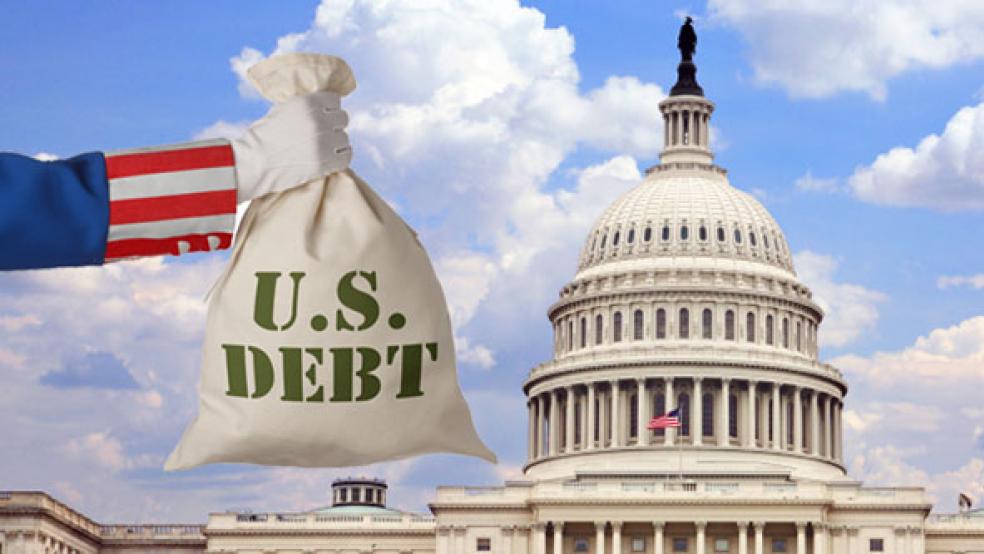Does the high and rising level of U.S. public debt matter? If so, how concerned should we be?
Goldman Sachs asks those questions in a new research piece, noting that the “fiscal outlook for both Italy and the US looks poised to go from bad to worse” — and yet, the market response to the two situations, as measured by yields on Italian bonds and U.S. Treasuries, “couldn’t be more different.”
Italian bond yields have surged since May as investors worried about the new government’s fiscal policy. Meanwhile, the rise in yields on 10-year Treasuries has been more muted — “despite the fact that the US deficit projections look significantly worse,” Goldman noted. (The yield on 10-year Treasuries rose above 3 percent on Friday for the first time in more than a month.)
To gauge the importance of public debt, Goldman’s Allison Nathan turned to two outside experts, Harvard economist Carmen Reinhart and Maya MacGuineas, president of the Committee for a Responsible Federal Budget. Here are some key points from each response, along with Goldman’s own view.
Reinhart: High debt levels are associated with lower economic growth rates over the long term. “This is in part because high debt levels constrain governments’ ability to respond to adverse shocks. So even in a country like the US, where I don’t expect a crisis, history suggests there are reasons to be concerned. … The most desirable way to reduce debt is through growth, and countries should take advantage of periods of relatively stronger growth to reduce debt. This of course is the opposite of the current approach in the US.”
MacGuineas: “As bad as the fiscal situation is, I don’t think a crisis is likely anytime soon. The US has the benefit of being a safe haven; we seem capable of being at the very heart of a global crisis and still attracting demand for US Treasuries. … And, so far, markets have been able to show remarkable optimism in the face of a very pessimistic fiscal situation because many other factors in the economy and in corporate America have been favorable. But fiscal health is one of the foundations of the economy. And when you are built on such an unsustainable foundation, should market sentiment tip in a negative direction for any number of reasons, the response is likely to be more severe than if we had a healthy balance sheet. Again, we just don’t have the fiscal flexibility to address a major shock. So I believe we are on thin ice that can crack at any time. … The twisted silver lining here is that hurtling ourselves toward rock bottom, as we are today, may force action sooner than would otherwise be the case. And the likely return of a trillion-dollar deficit next year may be the wakeup call that we need.”
Praveen Korapaty, chief interest rates strategist at Goldman Sachs: “[O]ne could theoretically argue that substantial government debt should lead to a ‘crowding out’ in interest rates. … In practice, there has been little evidence of this occurring either in the US or Japan. … Part of the reason we don’t observe crowding out is that the pool of savings is actually quite large: in the case of the US, the dollar is the reserve currency, so substantial global savings are recycled into Treasuries.”
Silvia Ardagna, senior Europe economist at Goldman Sachs: “US federal debt as a share of GDP remains well below the 90-100% threshold for long-term rates in developed markets to increase sharply on fiscal grounds. Of course, this rule does not always apply … the market might have a higher government debt tolerance for the US than for other countries, de facto pushing the threshold higher even as US debt rises.” On top of that, growth is strong and expected to get a boost from the government’s tax cuts and spending increases, so the debt-to-GDP ratio may not rise as much. Also, U.S. tax rates are low, leaving more room for them to rise in order to pay for future spending increases. “And lastly, the fact that the US and Japan have the ability to independently set monetary policy for their economies, in contrast to the Euro area countries, reduces the risks from fiscal imbalances, at least in the eyes of the market.” But a slowdown in growth, perhaps caused by some external shock, would likely cause markets to reevaluate the risks of a large and rising deficit.
Alec Philips, chief U.S. political economist at Goldman Sachs: “The US fiscal outlook is not good” and the rising debt-to-GDP ratio comes at a time when the interest expense looks set to climb substantially. That makes this uncharted territory. But we don’t expect significant reforms in the near term and “are not particularly optimistic about reform occurring soon after 2020, either, as public opinion polling suggests that the electorate does not currently view the deficit to be a particularly important issue.”





